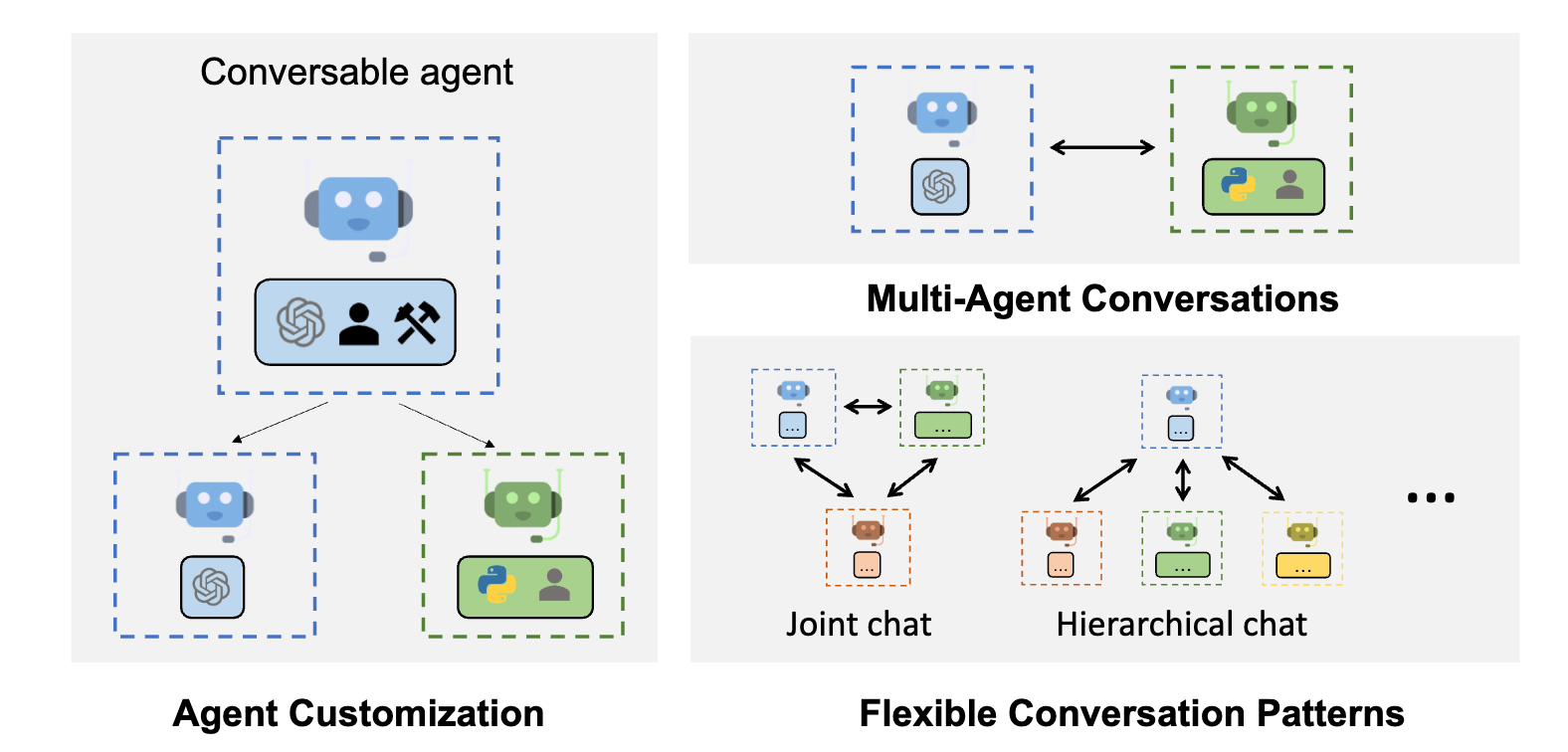
Today we will explore how to leverage AutoGen to prompt multiple AI models and have them work together for your goals
Welcome back to the MSU AI Club! In this workshop, we're diving into AutoGen, a groundbreaking open-source framework designed to help you create and manage your own AI agents. Whether you’ve interacted with large language models (LLMs) before or are new to the AI space, this session will show you how to harness the full potential of AI agents to automate repetitive tasks, boost productivity, and create applications across a wide range of fields.
Last time, we introduced a variety of AI tools designed to handle specific tasks like text and video generation. While these tools are powerful, they still have some limitations. The interactions are often one-way, with AI providing responses based on a single query. But what if you could push beyond simple question-and-answer exchanges and build an army of AI agents working together to solve complex problems?
That's where AutoGen comes into play.
AutoGen is an open-source programming framework for building AI agents, designed to facilitate cooperation among multiple agents to solve tasks. Think of it as the PyTorch for agentic AI—it simplifies the process of creating and managing autonomous agents, enabling you to customize how they interact with each other and their environment. The flexibility and ease-of-use make AutoGen perfect for developers, researchers, and even beginners who want to explore agent-based AI.
Key Features:
Facilitates the development of AI agents that can collaborate to solve complex tasks.
Automates repetitive tasks like scheduling, data collection, and basic research.
Enhances productivity by providing personalized tools such as study materials, code snippets, and project outlines.
Broad applications in industries like data science, robotics, finance, and healthcare.
With AutoGen, you can do more than just interact with a single AI model. You can automate processes, have your agents verify each other’s work, and create a dynamic system of checks and balances to improve accuracy and reliability. Imagine a world where your AI agents not only respond to your queries but also correct errors, clarify knowledge, and suggest better solutions in real-time.
For example:
A homework verifier could ensure that your answers for a coding class are accurate by checking the logic of your code and offering corrections.
A tutoring system can act as a personalized assistant, helping you study by clarifying difficult concepts and providing custom feedback.
So, what exactly is an AI agent? In the simplest terms, an AI agent is a specific implementation of an LLM instance. These agents are trained on either general or specialized data and respond to queries based on a system prompt that defines how they should behave. For example, one agent might be designed to correct errors in your homework, while another could summarize articles or provide market research insights.
AutoGen allows you to manage multiple agents, creating a network of AI tools that work in sync. Whether you're looking to streamline tasks or enhance your productivity, this approach represents a significant leap forward from interacting with just a single AI model like ChatGPT.

Creating effective AI agents involves several steps:
Devising an accurate system prompt: The agent’s behavior is defined by the system prompt you create. This could be anything from "answer coding questions" to "verify the logic of math problems."
Specifying tools: Each agent can be equipped with specific tools to enhance its ability to perform tasks. For example, one agent may use a code editor to verify syntax, while another accesses external databases for research.
Iterating for better results: Like any AI model, agentic AI benefits from iteration. You can refine your prompts and tweak the agents’ capabilities until they produce the desired results.
At MSU’s DSE Lab, we’re already using AutoGen to streamline tasks. Here’s a quick example of how multiple agents work together in a tutoring setup:
User (Student) asks a question.
AI Agent 1 (Answerer) provides a response.
AI Agent 2 (Verifier) checks if the response is correct.
If the answer is wrong, AI Agent 3 (Tutor) steps in to clarify the misunderstanding and provide a correct solution.
This collaborative system reduces errors and improves the accuracy of the feedback provided to users, enhancing both learning and productivity.


The possibilities are endless. Here are some ideas for what you could build with AutoGen:
News Summarizer: Summarize articles into a concise 100-word format for quick reading.
Market Research Tool: Automatically generate a market analysis by pulling data from multiple sources.
Essay Feedback Tool: Provide feedback on sentence structure and grammar in academic essays.
Music Composition Assistant: Generate music based on mood or genre, perfect for game development or filmmaking.
Ready to build your own AI agents? Here’s what you need:
Google Colab: We’ll be using Google Colab to run the AutoGen framework. To get started, make sure to join the MSU AI Discord server and access the workshop resources. Here's the link as well.
API Key: To power the agents, you’ll need an API key from OpenAI. This grants access to models like GPT, Codex, and DALLE. Don’t worry—you can contact us for an API key, but you can always apply your own.
Once you have access, follow the step-by-step instructions in the provided Google Colab notebook. You’ll be able to create, modify, and test AI agents in real-time.
AutoGen empowers you to turn your ideas into reality. Whether you’re building an app to automate a task or creating a tool to improve personal productivity, this framework provides everything you need to get started. We can’t wait to see what you come up with! Be sure to share your creations with the rest of us on our discord.
Let’s get started on building your own AI army!